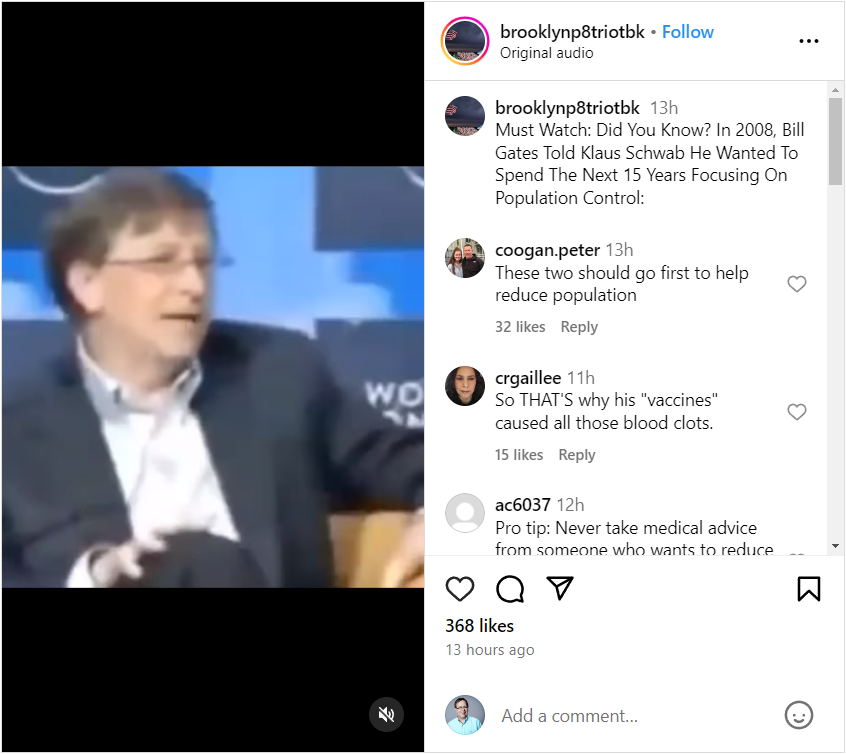
Did Bill Gates say in early 2008 that he wanted to focus on "population control", implying he wants to reduce the population? No, that's not true: Gates made a comment in an interview where he said he expected health programs dealing with certain diseases would affect mortality rates, which in turn would reduce growth in population. There is no credible evidence to support the claim that Bill Gates wants to reduce the world's population.
The claim appeared in a post and video (archived here) published on Instagram by brooklynp8triotbk on January 14, 2024. It opened:
Must Watch: Did You Know? In 2008, Bill Gates Told Klaus Schwab He Wanted To Spend The Next 15 Years Focusing On Population Control:
The first comment on the post implied the interview was about population reduction by saying "These two should go first to help reduce population".
This is what the post looked like on Instagram at the time of the writing of this fact check:
(Source: Instagram screenshot taken on Mon Jan 15 16:13:29 2024 UTC)
The video
The 90-second clip comes from a much longer discussion between Gates and World Economic Forum (WEF) founder and chairman Klaus Schwab at the 2008 WEF in Davos, Switzerland. Here's what the men said in the video on Instagram:
Schwab: Let me ask you a last question, Bill. Now you are doing yourself this transition into a new function, and you leave behind a legacy of having transformed the world into I would say an information society.
Now if you look forward at your next career step -- career may be not the right word here -- but at your next life phase, what would you like to see as your legacy in 10, 15 years?
Gates: Of the new work?
Schwab: Of the new work, of your new function.
Gates: Well, I've set very ambitious goals, because I'm quite optimistic. If you look at say the 20 diseases that our global health program goes after, I'd hope that within 15 years over half of those we could have had a very dramatic impact.
Some of them will prove to be harder than others. For example, AIDS we will have made an improvement, but not the dramatic improvement probably in that timeframe. Malaria perhaps, and a number of the other ones we have things in the pipeline.
So, huge change in the mortality rates in the developing countries, which then has this effect of reducing population growth. That's this big bene ... [cuts off the word "benefit"]
Out of context
The editing of the video leaves the impression that Gates was endorsing an effort to reduce the world's population, but that's not what he said. Gates explained that the diseases being targeted by his foundation's global health program were currently "reducing population growth." He argued that addressing ailments like AIDS and malaria would eventually make it easier to improve other things like education and nutrition.
A full transcript of the conversation can be found on the Microsoft website (archived here). Picking up with the last sentence in the video, Gates said:
So, huge change in the mortality rates in the developing countries, which then has this effect of reducing population growth. That's this big benefit that then makes everything like education and nutrition a lot easier.
So, I have very high expectations there, and we actually use these dashboards internally at the foundation to make everything be quite numeric. We're trying to be rigorous about that, and even share those so that people can see, oh, you fell short of what you had in mind, and then we get to explain if we have any lessons that might be learnable from other foundations.
So, I think there are some things about how we go about things that I hope those learnings can have an impact. There is the specific work in different divisions: health, development, and the U.S. education work.
But in 15 years, boy, by then we will have spent a lot of money. At $3 billion a year, and 15 years, that adds up, and for that people should have a very high expectation of what we can do.
While his choice of words was admittedly awkward, the conversation in the context of the Gates Foundation was about efforts to make life better for people around the world. The foundation website says (archived here):
We are focused on the areas of greatest need, on the ways in which we can do the most good.
From poverty to health, to education, our areas of focus offer the opportunity to dramatically improve the quality of life for billions of people. So we build partnerships that bring together resources, expertise, and vision--working with the best organizations around the globe to identify issues, find answers, and drive change.
Read more
Other Lead Stories fact checks mentioning Bill Gates can be found here.


















